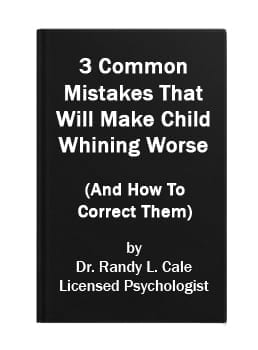 Many parents are concerned about their children’s success and start early to encourage, prod, nag, push, and “herd” the kids to get their work done. The nagging approach produces results when children are young but backfires in the long term. Children become more and more dependent, and their success dwindles as they approach their teenage years. Watch out for well-intentioned parenting behaviors that undermine the natural growth processes of children.
Many parents are concerned about their children’s success and start early to encourage, prod, nag, push, and “herd” the kids to get their work done. The nagging approach produces results when children are young but backfires in the long term. Children become more and more dependent, and their success dwindles as they approach their teenage years. Watch out for well-intentioned parenting behaviors that undermine the natural growth processes of children.
How To Create A Dependent Child (You Don’t Want This!)
I recently had two families in my office, each struggling with a 13-year-old child who appeared sad and withdrawn. To get their children out of bed in the morning, the parents engaged in an hour-long process of nagging and pushing and prodding, culminating in yelling and threatening. Often these parents had to take their children to school after they missed the bus. Homework routines were even more depressing. Throughout elementary school, both sets of parents had nagged their children about homework. When the children struggled, the parents would sit down and spend hours working through homework problems.
 The mistake these parents made was thinking that their children would “get it” at some point and start doing these things on their own. Children don’t just get it…usually. It requires a change in strategy!
The mistake these parents made was thinking that their children would “get it” at some point and start doing these things on their own. Children don’t just get it…usually. It requires a change in strategy!
You can’t push, prod, nag or coerce your kids into healthy patterns: If you want to create dependent children who are ill-prepared for adolescence, keep pushing and prodding. Keep nagging them to get their homework done and to get up in the morning. As they get older, they’ll become more and more difficult and dependent on your efforts.
Here’s a good rule of thumb: If you’re working harder than your children are for their success, you’re heading down the wrong path.
How To Nurture An Independent Child
Here are five principles you can apply to nurture independence in your children:
1. Have Faith.
The most important principle is to have faith in your children’s natural ability to learn from the consequences of their actions. Children are not stupid, although we often treat them as if they were by repeatedly making the same request. If you’re repeating your requests over and over, you have a parenting problem. Teaching kids that they need us to get through their daily activities is essentially teaching them that they’re handicapped in some way—they start believing that they can’t do it on their own. The first step is to allow your children to learn key life lessons on their own.
2. Your Words Rarely Teach. Consequences Teach.
If your words were effectively teaching your children to get out of bed, you wouldn’t have to say it more than once. You certainly wouldn’t have to yell. You wouldn’t have to do this every day.
However, there’s an important caveat here: When you use choices and consequences skillfully, your words do play a huge role in teaching your children. So how do you use this principle? You make certain that there is a consequence attached to not getting out of bed. Let the consequences teach – not your words.
3. Establish The Structure Of Success: Work, Then Play. Every Day.
The basic notion is that you structure your children’s world so that work (homework and responsibilities) comes before play (TV, videos, computer, telephone, friends, soccer practice, movies, games with Mom and Dad). Do this every day, including weekends. Make it a simple fact of life: We do our work, then we play.
 This principle is important for two reasons. First, it establishes a structure that allows play activities to be an immediate consequence and reward for finishing one’s work. This structure actually draws children into their work activities, which is much better that your pushing them. Second, this is the fundamental habit of successful students and successful adults. Individuals who do well in life do their work first, then reward themselves with play activities.
This principle is important for two reasons. First, it establishes a structure that allows play activities to be an immediate consequence and reward for finishing one’s work. This structure actually draws children into their work activities, which is much better that your pushing them. Second, this is the fundamental habit of successful students and successful adults. Individuals who do well in life do their work first, then reward themselves with play activities.
“Work, then play” is the most simple, yet powerful strategy you can implement to nurture independence in your children. Children embrace this principle quickly and easily, rather than resisting their responsibilities.
4. Ignore Anything You Don’t Want To Nurture.
 You’ve set up your home so the kids understand that they must do their work, then they can play. They come home from school and start to waste time. But they can’t call their friends; the TV set and computer aren’t available; and no one will take them to soccer practice. The world is pretty boring. Let them be bored. Let them whine and complain until they realize that it’s easier just to do their work. As soon as they start to work, implement principle 5.
You’ve set up your home so the kids understand that they must do their work, then they can play. They come home from school and start to waste time. But they can’t call their friends; the TV set and computer aren’t available; and no one will take them to soccer practice. The world is pretty boring. Let them be bored. Let them whine and complain until they realize that it’s easier just to do their work. As soon as they start to work, implement principle 5.
5. Catch them while they’re doing what you want.
Pay attention to them. When your children are starting to get out of bed, notice them. When they’re pulling on their socks, say good morning. When they pick up their pencils to do their homework, ask them if they want some juice. As they work on their math, compliment them on their hard work. When they clear the table – notice them. They’re answering the phone respectfully? Notice them. They’re playing cooperatively with a sibling? Really notice them.
This is very simple stuff: Engage them when they’re doing the things you want them to do. Do this consistently and repeatedly.
It’s as if you were starting a new lawn. After you seed a lawn, you have to give it lots of water and lots of attention for several weeks. As the lawn begins to grow, you can cut back on the water. As it matures, you only need to water periodically. Think of nurturing healthy behaviors in the same fashion. If you follow the simple process laid out in these five principles, you can turn bad habits around in ways that will surprise and delight you.
Remember the families with the withdrawn 13-year-olds? Both sets of parents came to me seeking help for their children, but when the parents pulled back—stopped pushing and prodding, and allowed their kids to learn from their mistakes—guess what happened? Everything changed. The kids began to get out of bed on their own and get ready for school. They missed the bus a few times, but they learned. They began to take ownership for their studies. When they got an F, it was their F. When they did their homework and got a B, it was their B. And the kids got happier. The burden of being a dependent child can be depressing to a developing adolescent. As these children became more responsible, their lives felt lighter, and they were more relaxed and engaging.
Sometimes we make the rules and requirements of life more complex than they need to be. The more complex we make the rules, the harder it is to live by them and the more often we fail. If you apply this simple set of guidelines, you might be amazed at how much easier and more comfortable life can become at home.

 ** Please double check for accuracy. Your privacy is SAFE. We will NEVER sell/rent/give away your information.
** Please double check for accuracy. Your privacy is SAFE. We will NEVER sell/rent/give away your information.













